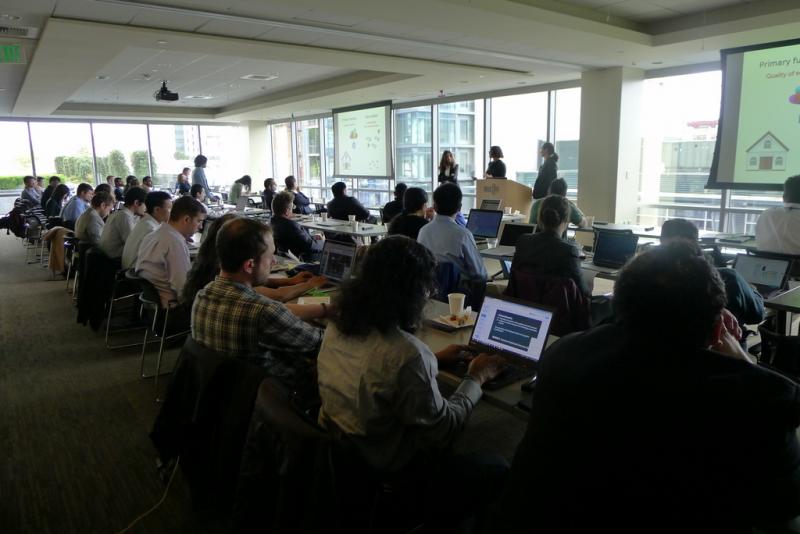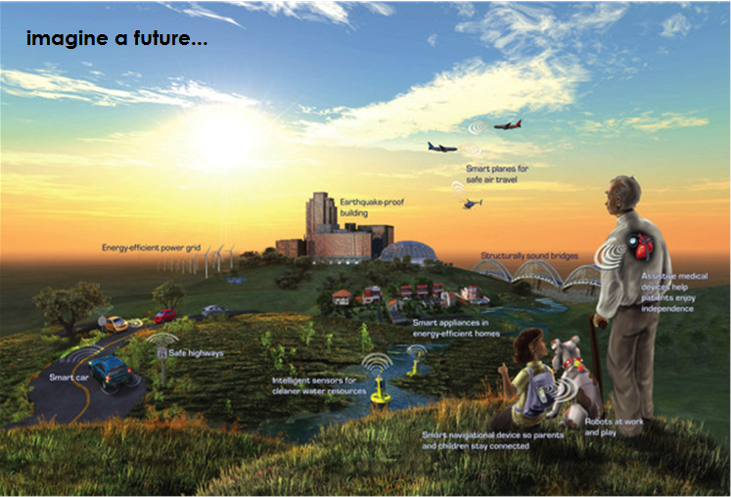Blog
Friday, April 17, 2015
Early-Career Investigators Collaborate to Develop and Present Research Ideas at the Intersection of CPS and Smart Cities, by Dustin Richmond (UC - San Diego)
Link to blog post: http://builtecologist.com/2015/04/20/ecicpsinsmartcities/

Tuesday, April 14, 2015
Cyber-Physical Systems and Smart Cities, by Cathy Wu (UC Berkeley)
Link to blog post: www.wu.cathy.com/blog/?p=2587
Monday, April 13, 2015
Discovering Exciting Opportunities in CPS and Smart City Research, by Ann Majewicz (UT-Dallas)
Greetings from Seattle! We just kicked off the first session for the CPS Early-Career Investigators Workshop on Exploring Cyber-Physical System Innovations for Smart Cities. This morning's keynote presentations were a call to action - how do we develop the smart and complete cities of tomorrow?
The concept of "Smart cities" isn't just about building more knowledge; it's about connecting knowledge to action in a way that improves energy, transportation, resource production and management, healthcare, infrastructure, and a host of social and cultural interactions that color the vibrancy of city life.
We leave you with a summary of thoughts from our keynote speakers and government sponsors this morning:
- Communication and power are the two largest networks in the world today. Both aim to provide a single commodity, reliably and efficiently, but only one has undergone significant, transformative change. It's time change power in the way that DARPA changed communication. It's time of the Internet of power. Steve Low (Caltech)
- "A city is a place of availabilities." When you think about your research, think about the big picture - how do you go beyond sensing to meaningful action?, beyond just developing technology but growing a human-centric ecosystem?, beyond just your knowledge, but leveraging the innovation potential that only diversity can bring? Vikram Janhdyala (UW)
- The study of how human users engage with both the cyber and physical world is the cornerstone of research in Urban Science. There is a degree of impatience in Urban Science - we don't have the luxury to tear down our cities and build them from scratch, we need to find ways to integrate our new knowledge with real-world applications that effect change today. Tho Nguyen (NSF)
Sunday, April 12, 2015
NSF Sponsors Workshop Focusing on the Future, by Tho Nguyen (NSF)
At Cyber-Physical Systems Week 2015, NSF is sponsoring a meeting of early-career investigators in cyber-physical systems to focus on exploring research challenges and opportunities in Smart Cities.
The Cyber-Physical Systems community is an exciting group of researchers and developers working to advance the emerging system science that deeply integrates computing (cyber) and engineered (physical) components. CPS enables truly "smart" technologies, systems, and infrastructures of the future. Examples of CPS today include the self-driving car, tele-operated robots, and smart-grid technologies.
With more than 80% of the US population living in urban environments, there is a clear and apparent need to further engage research and development innovations to enhance urban quality of life. Naturally, the CPS community plays a central role in the emerging Smart City paradigm.
NSF CISE Directorate prioritizes the professional development early-career investigators by supporting programs such as the innovative CISE Research Initiation Initiative (CRII) and NSF's CAREER Awards. Recognizing that researchers in the multi-domains field of CPS need broad perspectives beyond their research expertise, the CISE Directorate initiated an early-career workshop concept where new investigators gather for professional development, building professional networks, and engaging in a national a discussion to explore research opportunities with their peers. The early-career workshop is both a professional development activities for researchers and as well as mechanism for NSF to develop a core researcher community to address emerging national priorities.
The CPS program enabling smart technologies for the future; the emerging Smart City paradigm to enhance urban quality of life; and the community meeting for early-career researchers are all coming together at CPS Week 2015 this April 13-17, 2015 in Seattle, WA. The early-career workshop is led by exciting thought leaders in the field such as Maryam Fazel (UW), Steven Low (Caltech), Babak Parviz (Amazon Inc.), Glenn Ricart (US-IGNITE), Jose Baptista (Rockefeller Foundation), and Vikram Janhdyala (UW).
The 2015 NSF Early-Career Investigator Workshop for CPS and Smart City marks the first meeting to develop a core research community that is truly for the future.



